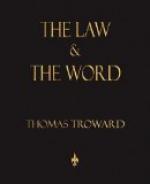The first question then is, where to begin. Descartes commenced his book with the words “Cogito, ergo sum.” “I think, therefore I am,” and we cannot do better than follow his example. There are two things about which we cannot have any doubt—our own existence, and that of the world around us. But what is it in us that is aware of these two things, that hopes and fears and plans regarding them? Certainly not our flesh and bones. A man whose leg has been amputated is able to think just the same. Therefore it is obvious that there is something in us which receives impressions and forms ideas, that reasons upon facts and determines upon courses of action and carries them out, which is not the physical body. This is the real “I Myself.” This is the Person we are really concerned with; and it is the betterment of this “I Myself” that makes it worth while to enquire what our Thought has to do in the matter.
Equally true it is on the other hand that the forces of Nature around us do not think. Steam, electricity, gravitation, and chemical affinity do not think. They follow certain fixed laws which we have no power to alter. Therefore we are confronted at the outset by a broad distinction between two modes of Motion—the Movement of Thought and the Movement of Cosmic Energy—the one based upon the exercise of Consciousness and Will, and the other based upon Mathematical Sequence. This is why that system of instruction known as Free Masonry starts by erecting the two symbolic pillars Jachin and Boaz—Jachin so called from the root “Yak” meaning “One,” indicating the Mathematical element of Law; and Boaz, from the root “Awaz” meaning “Voice” indicating Personal element of Free Will. These names are taken from the description in I Kings vii, 21 and ii Chron. iii, 17 of the building of Solomon’s Temple, where these two pillars stood before the entrance, the meaning being that the Temple of Truth can only be entered by passing between them, that is, by giving each of these factors their due relation to the other, and by realizing that they are the two Pillars of the Universe, and that no real progress can be made except by finding the true balance between them. Law and Personality—these are the two great principles with which we have to deal, and the problem is to square the one with the other.




